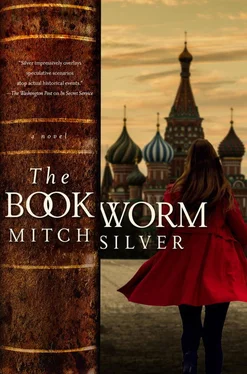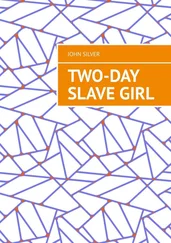Gerasimov broke his silence by pointing to one of the banners, showing the new American president and his Russian opposite number. “So, my Russian-American friend, how do you feel about your two peoples getting together?”
She thought about it. “Talking is better than shooting, I suppose.” She looked at him in the rearview mirror. “And you?”
“Wasn’t it an American who said, ‘My country, right or wrong’? I’m with him.”
Gerasimov steered the car toward the exit that led out of town toward St. Petersburg and points west. The surprise of it made Lara blurt out, “Where is this prompter of yours, Grisha? Poland?”
He smiled. “I have a media room upstairs at the dacha.”
“Wait a minute. Your dacha?”
“We do remotes from there sometimes.” He looked over at her. “Don’t worry, everything’s on the up and up. My son will be joining us.”
But she was worried; she barely knew this guy. What was she getting herself into? Leaving the Arkhiv, she’d called her roommate to say she’d be late getting back from practicing for her telecast and Katrina, predictably, had said, “With your man… of mystery?”
Still, Lara had never seen a dacha. Not a nice one, anyway. Oh, they’d tried. A long time ago, under Brezhnev, her father piled the family into the Zhiguli and drove the twenty miles from Moscow to Uspenskoye. The woods, when they could see them, were dark and beautiful, with little clearings that would have been perfect for the picnic lunch they’d brought. But a NO STOPPING line was painted on the edge of the road, all the villages had TRANSIT ONLY markers and, just to be sure, a ten-foot-high green fence set back from the road ran for miles in both directions with NO ENTRY signs on every side street. The workers, who theoretically owned everything in the Soviet state, were as unwanted as capitalist spies.
When she looked up, Gerasimov was pulling off the main road and heading the Alfa across a little wooden bridge and up a lane dotted with the comfortable cottages of which every Russian dreamed. He was saying, “Can you believe it, ours was once Nikolai Bulganin’s place. The official retreat of the Soviet premier and just one bathroom! As the Americans say, it needed an extreme makeover.”
Lara thought back to the picnic. By the time they’d driven past the forbidden district, the children were hungry and complaining, and Father pulled over in the yard behind a closed gas station. They ate their pirogis on the rough wooden table where the workers had lunch. Some picnic.
The worst of it was, her parents had acted as if it was what they had intended all along. Two beaten-down victims of the Soviet state, grateful for the crumbs they were thrown. No wonder she’d jumped at the chance to go to university in the States.
His place, as they approached it, was originally one of those Grimm’s fairy tale cottages in the Russian style, with eaves that came down practically to the ground. Put up in the 1920s or ’30s, it had recently doubled in size, and there were all manner of satellite dishes on the roof. “You can use the room to the right at the top of the stairs to freshen up, the one with its own bathroom. Then come back down and make yourself comfortable. When I return, we’ll begin.”
“You’re going?”
“I have to get a few things. I promised you food, remember? I won’t be long; why not listen to some music here ’til I get back? We have iTunes.”
Lara must have dozed off for a while in the overstuffed chair that sat in front of the unlit fireplace, because she awoke with a start, nearly pulling the headphones off her head. Someone else was in the house, she could feel it. She called out Gerasimov’s name. No answer. She could hear water running. Was it the rain? She looked out the window. Nothing yet.
Lara crossed the hall and opened a door that led to the vast, updated kitchen. A young man of not more than twenty-five, with longer hair than was stylish, was washing something in the utility sink. He was shirtless, with blue and black tattoos covering his well-muscled body. Just as Lara saw that whatever was in the sink was making the water turn red, the young man looked around.
He smiled. “I’m the son… Nikki. Like what you see?”
Lara blushed and turned away from the door. The young man continued his washing and added a little whistling for good measure.
Chapter 31

Uspenskoye
Lara would eventually discover the no-longer-bloody shirt outside on a line, the stains still visible on the cuffs and under the buttons. But that would be later. Right now, she was sitting with her legs drawn up under her on the cushioned built-in piece that ran the length of the big front window, her brain in disarray, watching the first drops come down outside while going through the motions of working on a chess problem. Trying not to run into Nikki again before his father came back.
The little folding wooden chessboard her father had hewn for her, with the tiny holes in each space for the pieces to fit in, was the one good thing to have come out of Perm. She was staring at a discovered check Tal had sprung on Smyslov in their championship match. Should he have seen it coming? A dirty American pickup truck was parked where the little Alfa had been. The rain was starting to clean it off. She knew her mind was wandering and she let it.
When, at the Radisson, Lara had said all the best historians were in the camps, she’d meant it. She still thought of her father and his colleagues as prisoners behind the Urals. Perm was a true Soviet city, with rutted streets, numbered “dormitory” blocks and architecture so ugly it must have been a deliberate choice. A closed city which opened periodically to swallow “deviationists” like Lara’s parents and the other faculty members in the years right before Stalin died, when the terror was building once more. And then, miraculously, Perm spit them out again in the “thaw” under Khrushchev.
Lara’s mother died there. Not in body, but in spirit. Once they were returned to Moscow, there was no work for which they were trained, not for a pardoned kosmopolit , a cosmopolitan (okay, Jew), and his Muslim wife. So the man who understood the history of the West better than most Britons and Americans plastered crumbling ceilings and fixed leaky pipes and began his own long descent into uselessness.
She took the picture out of her handbag and studied it, as she had a thousand times. Two young, fresh-faced university graduates on their wedding day: the son of the Old Bolshevik, a brilliant career ahead of him, and his just-as-brilliant bride, the scholarship student from Tajikistan, two thousand miles and who knows how many centuries away to the East. Decades too late, they tried to make their world more normal, more “Russian,” by making a family when they were almost old enough to be grandparents. So Lara—named for the heroine of the Pasternak novel, naturally—and her brother Lev had been Brezhnev babies, the youngest children by far of all her parents’ Moscow friends.
The tattoos made it all come flooding back. The inky, unearned prison insignia she’d seen on Nikki’s back and chest meant he was in Nashi, the marauding band of young nationalists Lev called “our own Hitler Youth.” While the father professed democratic ideals. And here she was, under the same roof. Crazy.
In the quiet of the country, the sudden ringing of her mobile phone made a terrible racket. “Yes?”
“Larashka, are you all right?”
Читать дальше













